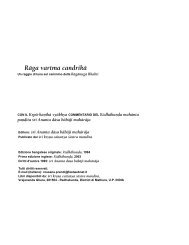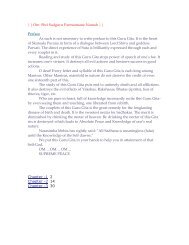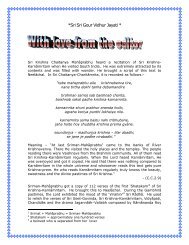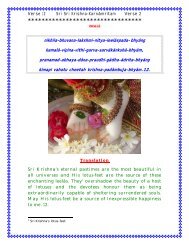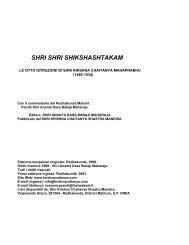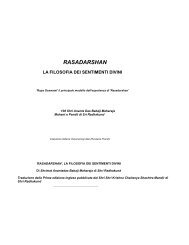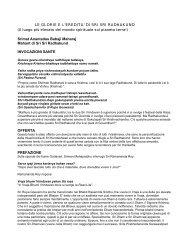Obstacles Bhakti - Kunjeshwari Home
Obstacles Bhakti - Kunjeshwari Home
Obstacles Bhakti - Kunjeshwari Home
You also want an ePaper? Increase the reach of your titles
YUMPU automatically turns print PDFs into web optimized ePapers that Google loves.
<strong>Obstacles</strong> in <strong>Bhakti</strong><br />
je baishnab-sthane apardh hoy jar,<br />
punah se khomile se ghuche nohe âr.”<br />
Meaning – “The Lord said –I can instruct you on this matter, but I cannot<br />
take away your Vaishnav-aparâdh. The only way to get rid of this aparâdh is<br />
to beg forgiveness from the person against whom you have committed the<br />
aparâdh. If he forgives then you are saved, there is no other way.” - (C.B.)<br />
Therefore, we must please the one against whom we have committed an<br />
aparâdh by glorifying him and showing him respect. It does not mean we<br />
should go and angrily beat our head on the ground saying, “Sir! Please<br />
forgive me. It is entirely my fault! I should have never spoken to you at all!<br />
From now on I‘ll never talk to you and you mustn’t speak to me either.” In<br />
this manner if we harbor anger against that person then it is of no use.<br />
The best way to rid ourselves of aparâdh is to repent. “Alas! I am ignorant,<br />
so I have committed aparâdh against a Vaishnav. Unknowingly I have hurt<br />
the feelings of a Vaishnav, shame on me! I am not qualified to be called a<br />
devotee at all. If my heart is blemished like this I shall never ever progress in<br />
bhakti.” In this way, we should be ashamed of ourselves. Bow at the feet of<br />
the one against whom we have committed aparâdh and cry out in misery for<br />
forgiveness. Sri Vishwanath Chakravartipad has stated the same –<br />
“tatashcha daivat tasminnaparâdhe jate ‘hanta pamarena maya sâdhushu<br />
aparâdhâmiti’ anutapta janah ‘krishanou shâmyati taptang krishanano<br />
evayam’ iti nyayena tatpadagra eve nipatya prasadayamiti vishannachetasa<br />
pranatistuti samman-adibhis-tasyopashamah karyah.”<br />
After much trying if we are unable to please the devotee, we should continue<br />
to try to please him by doing things to please him. If we are still not<br />
successful, we should chastise ourselves, be very much repentant and take<br />
the shelter of Holy Name. We must also take an oath that we shall never<br />
again commit am aparâdh like this. Then some day Sri Nâm-prabhu will take<br />
mercy on us.<br />
Vivek das –That's good. The Shâstras say, “If we take the shelter of Holy<br />
Name we will be rid of all aparâdh.” So isn’t it better to follow Shâstra and<br />
take the shelter of Holy Name rather than beg others repeatedly to forgive<br />
us?<br />
Gour kripa – In that case we will commit another aparâdh called<br />
’to commit a sin on the strength of Holy Name’. We have to follow the<br />
above-mentioned rule only when we don’t know against whom we have<br />
committed an offence, or the person whom we have offended, is no more. It<br />
leaves us with no option other than to take the shelter of Holy Name. Then<br />
may be Holy Name will take mercy on us. Even then, we must remember<br />
that we must repent enough and we must be especially careful about not<br />
committing such an aparâdh again. Otherwise, Sri Nâm-prabhu will never be<br />
pleased.<br />
Many times, we see that great devotees do not take offence in spite of<br />
behaving badly with them or insulting them. Instead, he considers it his own<br />
fault and repents. Even if someone treats him unjustly, or expresses anger,<br />
10



